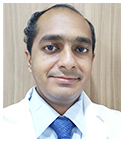Thyroid Clinic
At the Thyroid Clinic at Sir H. N. Reliance Foundation Hospital and Research Centre, our experts provide a comprehensive range of services covering the diagnosis, investigation, and management of the various thyroid disorders, including hypothyroidism, hyperthyroidism, thyroiditis, goitre, thyroidassociated orbitopathy, thyroid nodules, and thyroid carcinoma.
The focal point of the clinical service is the Thyroid Clinic, held weekly at the 2 nd floor of Heritage building, which offers clinical assessment, diagnosis and treatment. Radioactive Iodine therapy is offered for the treatment of hyperthyroidism. Fine needle aspiration biopsy service is offered for patients with thyroid nodules.
The team of Endocrinologists also works closely with surgeons to offer a multidisciplinary approach to thyroid conditions and thyroid dysfunction. This experience means the clinic can offer you the best solution to your problem tailored to your individual needs. You can be assured that you are in expert hands.
Thyroid hormones regulate our body's metabolism and influence virtually every organ system in the body. They tell organs how fast or slow they should work. Thyroid hormones also regulate the body's consumption of oxygen and production of heat. Thyroid problems, such as an overactive or underactive thyroid, can severely affect metabolism. The Thyroid Clinic offers expertise in all aspects of thyroid conditions. At your first appointment our Consultant, will undertake a full clinical assessment and arrange the most appropriate investigations. He may then recommend follow-up treatment or a surgical consult if required.
- What is a thyroid gland and what does it do?
The thyroid gland lies in the front of your neck in a position just below your Adam’s apple. It makes two hormones that are secreted into the blood: thyroxine (T4) and triiodothyronine (T3). These hormones are necessary for all the cells in your body to work normally.
- What do my thyroid hormones do for me?
The hormones T4 and T3 regulate the pace with which your body cells work. If too much of these hormones are secreted, all cells work more rapidly than normal, and you have hyperthyroidism. In contrast, if inadequate amount of these hormones are produced (known as hypothyroidism), all cells of your body slow down.
- Who is affected by thyroid disease?
Currently, almost 42 million Indians have some form of thyroid disease. People of all ages can get thyroid disease. A recent study across 8 cities of India revealed the prevalence of thyroid disorders to be around 11 % of the urban population, with women being 3 times more prone to the disease than men. One third of hypothyroid patients are unaware of their condition.
What is hypothyroidism?
Hypothyroidism is the medical term for when a person makes inadequate thyroid hormone. In this condition you usually feel tired.
What are the symptoms of hypothyroidism?
Some people with hypothyroidism have no symptoms. The most common complaint is feeling tired. Other symptoms of hypothyroidism include weight gain, inability to tolerate cold easily, hair loss, constipation, slow heartbeat, swelling in your ankles, high cholesterol, irregular monthly periods and difficulty in conceiving.
In women who do get pregnant, there are chances of having a miscarriage and of having a baby with low intelligence.
- Medication
- Duration and Dose
- Pregnancy
- Surgery
- Subclinical Hypothyroidism
Medication
The treatment for hypothyroidism is thyroid hormone replacement therapy. This is usually given as a tablet of T4 (levothyroxine). T4 should be taken once per day on an empty stomach (ideally one hour before eating or three hours after dinner). All brands are equally effective. However, it is preferable to stay on the same manufacturer of T4 rather than switching between brands.
In most cases, symptoms of hypothyroidism begin to improve within two weeks of starting thyroid replacement therapy. However, people with more severe symptoms may require few months of treatment before they fully recover.
Duration and Dose
Your endocrinologist will prescribe an initial dose of T4 and then retest the blood level of TSH after four to six weeks. The T4 dose can be adjusted at that time, depending upon these results. This process may be repeated few times before hormone levels become normal. After the optimal dose is identified, a provider may recommend monitoring blood tests once yearly, or more often as needed. Most people with hypothyroidism require lifelong treatment, although the dose of T4 may need to be adjusted over time. Never increase or decrease the T4 dose without first consulting a doctor. Over replacement of T4 can cause mild hyperthyroidism, with the associated dangers of atrial fibrillation (irregular heart beat) and accelerated bone loss (osteoporosis).
Pregnancy
Women often need higher doses of T4 during pregnancy. Testing is usually recommended every four weeks, beginning after conception, until levels are stable, then once each trimester. After delivery, the woman's dose of T4 will need to be adjusted again, usually returning to the prepregnancy dose.
Surgery
Hypothyroidism can increase the risk of certain surgery-related complications. If preoperative blood tests reveal low thyroid hormone levels, nonemergency surgery is usually postponed until treatment has returned T4 levels to normal.
Subclinical Hypothyroidism
Subclinical hypothyroidism is when the TSH is elevated but the T4 is normal. The decision to treat subclinical hypothyroidism with T4 is controversial. Patients with a TSH >10 mU/L are usually treated. The decision to treat patients with a TSH that is above the upper limit of normal (this cutoff can vary but is usually around 5 mU/L) but below 10 mU/L is often based upon age and the presence of goiter (enlargement of the thyroid) or new or worsening symptoms of hypothyroidism. Symptoms can include fatigue, constipation, cold intolerance, or depression. Younger patients (under age 65 to 70 years) are treated more often than older patients.
What is hyperthyroidism?
Hyperthyroidism is a condition that can make you feel shaky, anxious, and tired. It happens when your thyroid gland, makes too much thyroid hormone.
What are the symptoms of hyperthyroidism?
Some people with hyperthyroidism have no symptoms. When they do occur, symptoms can include anxiety, irritability, trouble sleeping, weakness, trembling, excessive sweating, inability to tolerate hot weather, fast heartbeats, weight loss, increased appetite, frequent bowel movements. It can also cause a swelling in the neck called a "goiter." In some people eye changes may be noted like – redness, bulging eyes, inability to close eyelids completely.
Is there a test for hyperthyroidism?
Yes. Your doctor can test you for hyperthyroidism using a simple blood test. If the blood test indicates a problem, the doctor might run further tests, too.
How is hyperthyroidism treated?
Hyperthyroidism can be treated with:
Medicines – Two types of medicines can be used to treat hyperthyroidism:
- Anti-thyroid medicines reduce the amount of hormone your thyroid gland makes.
- Beta-blocker medicines help reduce the symptoms of hyperthyroidism.
Radioactive iodine – Radioactive iodine comes in a pill you swallow. It destroys much of the thyroid gland. Pregnant women should not use this treatment, because it can damage the baby's thyroid gland. But the treatment is safe for women who are not pregnant and for men. The amount of radiation used is small. It does not increase the chance of getting cancer, and it does not cause problems getting pregnant in the future or increase the risk of birth defects in future pregnancies.
Surgery – Doctors can do surgery to remove part or all of the thyroid gland. Doctors do not often recommend surgery, because other treatment choices are safer and less costly. Most people who are treated with radioactive iodine or who have surgery end up making too little thyroid hormone after treatment. They must take thyroid hormone pills after treatment, usually for the rest of their life.
What if I want to get pregnant?
If you take anti-thyroid medicine, talk to your doctor before you start trying to get pregnant. You will probably need to take different medicines at different times in your pregnancy. Plus, your doses might need to be adjusted. If you were treated with radioactive iodine, wait at least 6 months before you start trying to get pregnant. Whatever treatment you use, you should have your thyroid hormone levels checked often during pregnancy. Thyroid hormone levels must be at the right level during pregnancy to avoid risks to both the mother and the baby.
What are thyroid nodules?
Thyroid nodules are round or oval-shaped growths in the thyroid gland. These nodules are common and are not usually harmful to a person's health. But sometimes, thyroid nodules are caused by a serious condition, such as cancer. The thyroid gland makes a hormone called "thyroid hormone." Most thyroid nodules do not change the amount of thyroid hormone in the body. But some cause the thyroid gland to make too much thyroid hormone, which can cause symptoms.
What are the symptoms of a thyroid nodule?
Some people do not have any symptoms. They might find out that they have a thyroid nodule when their doctor feels it during a routine exam. Or a doctor might find nodules on an imaging test that was done for another condition. (Imaging tests like ultrasound or CT scan create pictures of the inside of the body.)
Other people have symptoms. For example, they might feel or see a lump in their neck. Or they have symptoms from having too much thyroid hormone, such as - feeling worried, upset, poor sleep, feeling weak or tired, losing weight, fast heartbeat and frequent bowel movements
Will I need tests?
Yes. Your doctor will want to make sure that the thyroid nodule is not a threat to your health. Tests usually include blood tests and an imaging test of the thyroid called an ultrasound. Sometimes, people need more tests. These include:
- Fine needle aspiration cytology– For this test, a doctor uses a thin needle to remove a small sample of tissue from the thyroid nodule. Then another doctor looks at the tissue under a microscope. In some cases, the tissue is sent for other tests. These tests can help doctors decide which nodules should be removed by surgery and which nodules can be watched.
- Thyroid scan – People get this test only if they have too much thyroid hormone in the body. For this test, a person gets a pill or a shot with a small amount of a radioactive substance. Then, a special camera takes a picture of the thyroid gland. This test is not safe for women who are pregnant or breastfeeding.
How are thyroid nodules treated?
Thyroid nodules are treated in different ways, depending on their cause and how much thyroid hormone is in the body. Different treatments include:
- Watching and waiting – Doctors don't always treat thyroid nodules right away. A doctor might watch a thyroid nodule if it is small and doesn't look serious. But he or she will follow it closely to see if it grows bigger or needs to be treated.
- Medicines – Doctors can shrink thyroid nodules using thyroid hormone medicines. If you take thyroid hormone medicines, your doctor will check your thyroid hormone levels on a regular basis.
- Radioactive iodine – Radioactive iodine comes in a pill that you swallow. It has a small amount of radiation and can destroy a lot of the thyroid gland. It is used only to treat nodules that make too much thyroid hormone. It is not safe for women who are pregnant or breastfeeding.
- Surgery to remove the thyroid nodule
- A procedure to drain fluid from the thyroid nodule, if it is filled with fluid
What if I want to get pregnant?
If you want to get pregnant, talk with your doctor. Women who are pregnant should not be treated with radioactive iodine. That's because radioactive iodine can cause serious harm to a baby. If a woman is treated with radioactive iodine, she needs to wait at least 6 months before trying to get pregnant.























